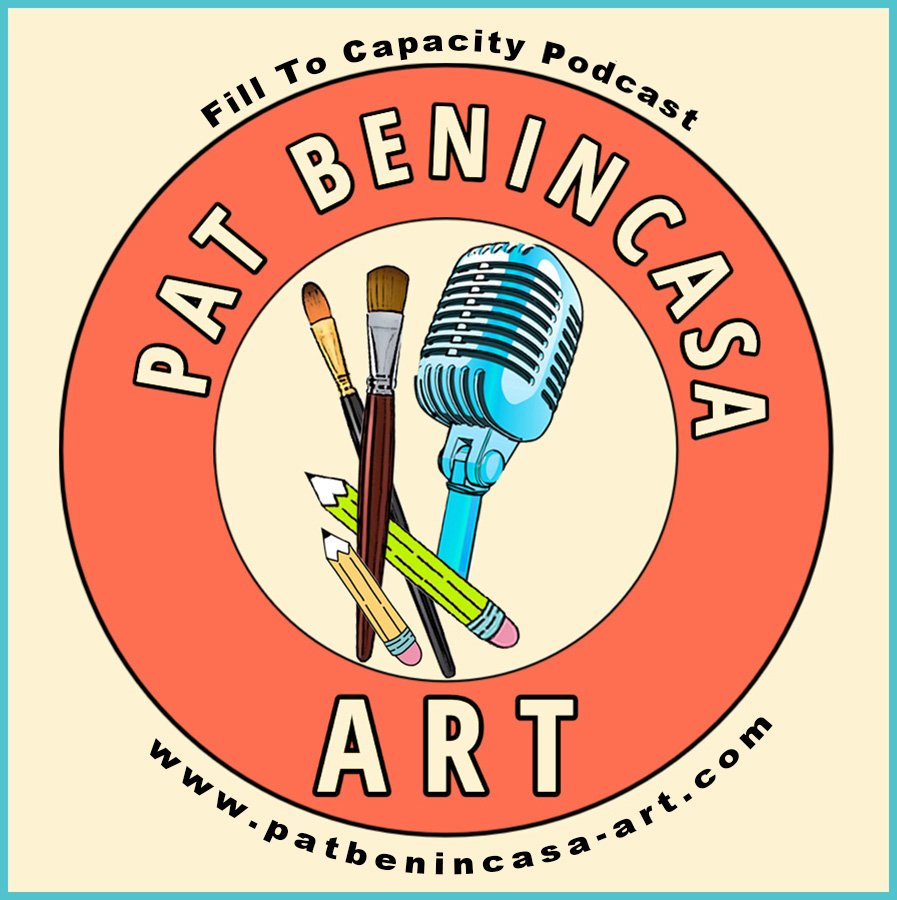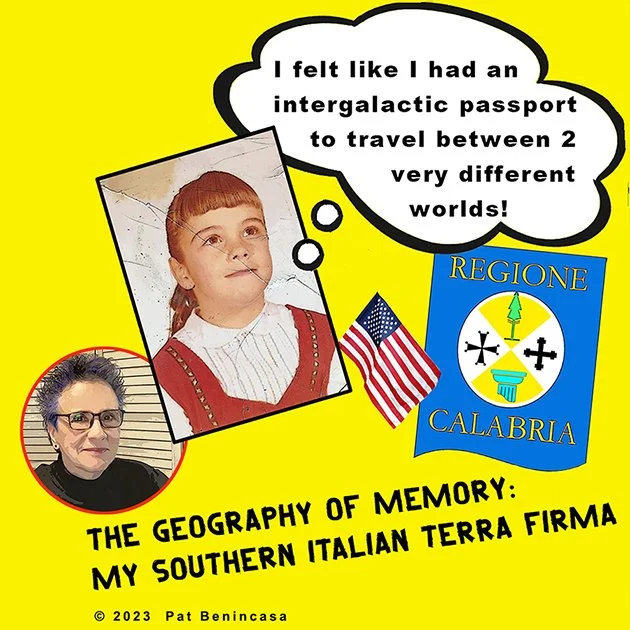The Geography of Memory: My Southern Italian Terra Firma
My life is a stark combo-plate of two different realities: one a heaping dish of Americana with TV families and suburban bliss- the other, a rich smorgasbord of immigrant life, filled with accents and yummy aromas of a distant land. This is a tale of two worlds woven into the very essence of my being.
My parents, born in Italy, were self-employed and worked all hours. They spoke perfect English without a trace of accent. They read paperbacks and Reader’s Digest, and TV highlights included any and all westerns, and specifically “High Noon” with Gary Cooper. My brother’s name is Gary.
At home, we were like other American families, except for the great culinary divide: We ate Italian, and others did not. Italian was never spoken, and we just blended in, except for Saturday mornings.
I would get up early to watch cartoons, and then a man in a serious voice would come on and warn all non-citizen residents or “aliens” to register with the government and what would happen if they didn’t. I panicked as any 6-year-old would! Was he talking about my aunts and uncles or my grandmothers? I watched and waited for weeks and was eventually relieved that no one was taken away! So how American was I?
In the 1950’s there was fear of Communist infiltration which led to government programs like the “Security Alien Registration Program” that came about to identify potential security risks and foreign agents.
I can assure you; my Southern Italian relatives were neither.
As for the day-to-day mechanics of how we lived; my parents worked all hours, my brother Gary and I spent a lot of time between two Aunt Mary’s. Each household was equipped with a non-English speaking grandmother and was filled with visiting relatives and and cousins. We did everything with relatives; birthdays, holidays, graduations, weddings, and visits.
Most of them spoke broken English and they inhabited a world of sing song language, heavenly food smells, animated conversation, hands-on work, and a very non-American way of being. This was for me, a re-constituted old country- my emotional terra firma.
My Aunt Mary, Uncle Echo and Grandma Rafaela lived on South BLVD, in one of only two houses in downtown Pontiac surrounded by factories. I didn’t notice the industrial, urban location until many years later. My aunt and uncle had one house, and across a gravel lot, the second house they rented to a long-term tenant.
The South Blvd house had two huge, lush gardens flanking the back yard with an overhead grape arbor. Towards the end of the lot was the chicken coop and a large pen with two honey-colored boxers.
Relatives stopped by day and night. Uncle Echo worked at a factory, but at the end of the day, he would sit beneath the grape arbor with friends, each with a shot and a beer telling stories with gestured details and nods of approval. My Aunt Mary orchestrated all-things house, from making homemade pasta and sausages to laundry on the line or holding court in the kitchen when family stopped by.
The thing about these newly minted “Americans,” was that they came to this country with amazing skills and creative dexterity to make a lot of something out of nothing. It was no big deal, just part of their DNA.
One story comes to mind. My mother collected China tea cups and wanted a buffet to display them. One weekend, Uncle Echo and his son Donny came to the house with tools and lumber. By the end of three days, between our dining room and kitchen, stood a beautiful, birch buffet with cupboards on both sides and open shelves adorned with a colorful array of translucent cups. I watched them work- a precision dance of choreographed tools and knowing, without a blueprint!
My Grandmother Rafaela, born in 1879, was a 4’-11” dynamo- a joyful, animated persona moving at warp speed throughout the day! The chicken coop and gardens were her domain. She loved being outdoors and having her hands in the dirt. I loved to follow her and do the things she did. There was a way that we understood each other, even though I didn’t speak Italian, it didn’t matter, because we spoke the language of the heart.
TV was still a novelty, but when it arrived at South Blvd, it quickly had huge repercussions. Everyone marveled at the little screen with images!
The next morning, so early it was still inky dark, Grandma Rafaela was pounding on Aunt Mary & Uncle Echo’s bedroom door, telling Mary to get up! They had to hurry and clean the house. So, they did.
The next morning, it happened again, and they moved quickly cleaning everything. On the 3rd day, Aunt Mary had had enough! Basta!
Confronting her mother, she asked her why did they have to clean the house before sunrise? My Grandmother looked at her with a pleading agitation and said: “Because the little people in the box will see that the house isn’t clean!”
Looking back with an emotional distance of many years, I have to say, there was something magical about living in two worlds. How is it that as we age, we excavate years of accumulated emotional clutter to find the raw material of our identity?
Back to So Blvd. My mother would drop us off for the day and when she picked us up, she’d asked: Did they behave? And Aunt Mary always gave her full-throated, Yes! However, what she didn’t say was how my brother took apart anything that had screws on the cover.
As for my re-constituted old country world, I cannot gloss over the glitchy downside, like the belief that girls didn’t go to college, they got married. Because both my parents were the babies of their families, they chose the American notion that girls could go to college. At that time, prevalent thinking said: college educated girls would make better wives.
I often felt like I had an intergalactic passport to travel between two very different worlds simultaneously. I don’t think I am alone in feeling this way. Anyone who grew up with immigrant parents or grandparents lived in two worlds.
In my case, let me explain. My relatives came from Calabria, a region of high illiteracy and severe poverty. The Calabrese are a determined, and at times, a bull-headed people. They earned their nickname: “Testa Dura,” or “Hard Heads.” They left their rural village and everything that was dear to them and came to the US, to the Detroit area.
Like many immigrant children, my mother recollected how she was placed in kindergarten not understanding the language, but she eventually learned to speak flawless English.
My relatives got jobs in factories, or started grocery stores or bars, or built the sewer system between Pontiac and Detroit. One thing the Calabrese know, is hard work.
My parents had a business and they wanted to be Americanized in every way, and my relatives were only themselves, transplanted in this new country- hence two different worlds!
Is this not the immigrant dilemma?
How much of myself do I give up to “blend in” and how do I cherish and preserve my ancestral roots? People who have never had to move to a new country do not have to weigh and measure pieces of their identity to fit in. Nor do they have to silence their DNA that says otherwise.
To you, my beloved ancestors, in your blood is my knowing.
Note: This is a revised version based on my Fill To Capacity Podcast #45: The Geography of Memory: My Southern Italian Terra Firma

